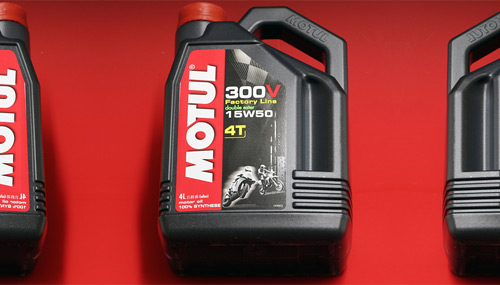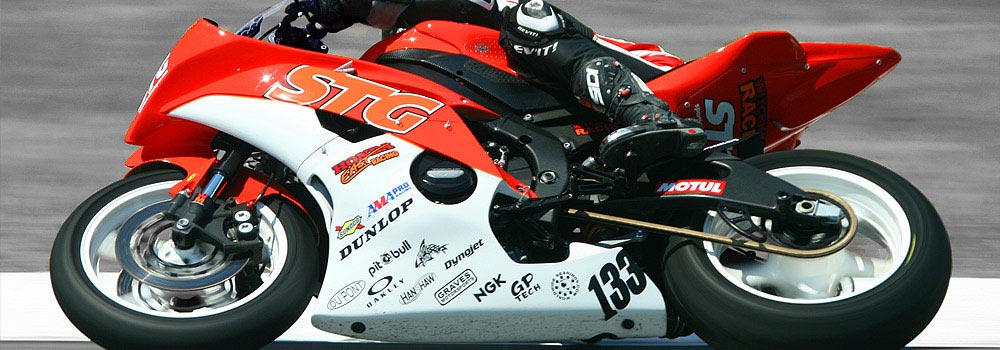-
Motul Oil Q and A

Recently I had the chance to ask Garrett Andrews of Motul a few questions on their brand of oil. We've been running it for the past several years with great results, but with all the different oils out there, I wanted to ask him some questions that would be applicable and hopefully show why Motul is as good as it is, being a leader both on the track and off it via some specific test results as well – specifically one recent independent test being passed out during the Indy Dealer Show back in February.
Q. Why should I use Motul?
Motul has been around for more than 150 years. We started doing Ester technology over 30 years ago and as you'll see much of our competitors are now switching to esters. Ester is a by product from fatty acids, taken from vegetables (renewable resources). An ester is negatively charged meaning it bonds to metal. So when using our product you always have 1/1000000 of an inch barrier, so there’s never metal to metal contact, even if the bike is stored for long periods of time. 300V is our flagship, it contains a double ester – one ester for friction or rubbing and another ester for pressure.
Q. Which Motul product should I use in a race application?
For road racing use 300V would be the best to use as it offers the best protection. It's a cheap insurance in case something goes wrong. 300V has a very high boiling point at 367.
Q. What's the difference between 10W/30 and 10W/40 oils?
10w means 10 winter. This # is how the oil flows through a specified hole at 0 degrees. The second # is how the oil will flow at running temperature 210 degrees. These #'s are set by how fast it flows through the specified hole. This is determined by the Society of Automotive Engineers or SAE. Multi-grades are used because you need oil to flow thin when it is cold and thick when it's hot. The flow is measured by a viscometer, but put in SAE's easier numberings that are labeled on the bottles. So at 200+ degrees, the 10W/30 will flow faster than the 10W/40.
Q. How often should I change my oil and oil filter?
Performance oils have the same life span as any other oil. Everyday riding, refer to your manual to see when the manufacture recommends changing it. Under racing conditions, the oil should be changed between race weekends. The temp of the oil gets much hotter and breaks down much faster – especially when doing 3-6 races in a weekend, or even a day. Ideally the oil probably still has some miles to go on it, but that can depend on how modified the engine is and how many races really are done. So it may vary depending on the racer/rider.
Q. What is the relationship between protection and performance of a motor oil? Obviously the more power you can get the better, but you need to protect the motor as well. Some oils have claims that they offer higher horsepower performance. Is this a sacrifice to protection?
Correct. From what I've seen, for the companies that tend to claim this, the oil is very thin. So the less drag the more power you make. Lots of times people will use a thin oil or (qualifying oil) to get a better laps times during qualifying. Then at race time they'll go back to a thicker oil that will last through a 20-30 lap race.
The advantages of the 300V, is again, the film that the ester puts down and prevents metal to metal contact. A second advantage in the 300V series is that the ester has four to five times the film strength and tensile strength of others. It is again, more of an insurance policy. Compare cooking with butter and cooking with olive oil. If you leave the butter cooking too long in the frying pan, when it gets too hot, the oil will evaporate at a certain point (volatility), it will actually carbonize and leave a mess because it has overheated. The ester has a very high running temperature of 365 degrees in the 300V oil which will stand up to very high temperature in an emergency. You get the best of both worlds with the 300V.
Q: Why does 300V Racing oil cost more than off the shelf products?
An ester based synthetic is not pumped out of the ground. They are collected from vegetables, coconuts and Methyl products. It drives the prices way up. Mobil 1 and Castrol are designed for modern street cars. 300 V is designed for performance. Some of our products may be designed for energy conservation but they will never have energy conserving paramount and that is a complete difference in theory. We like to have some resistance on the rings because the rings are meant to seal. A total reduction of friction on the other hand is not very good for internal combustion motors. You have to have some properties to make sure the rings are sealing, etc. We use a different additive package and a different base. Other products are designed for moderate horsepower, moderate performance and moderate compression. What we do with the 300 V is develop it for high performance first, not a mileage situation. The 300V is the top of our line and has major portions of research and chemistry-modification research going on constantly.
- ends -
If you have any other questions, pass them along here and I'll get them answered for you.
Cheers,
eddie
64 Comments on “Motul Oil Q and A”
Trackbacks:
Have Your Say:
* We don't spam. Your email address is safe and secure.
About This Entry
- You're currently reading "Motul Oil Q and A," an entry on Witchkraft Racing.
- Published: 12.2.08 / 10am
- Category: Sponsor News


- Arai Helmets
- Ballistic Performance
- Chicken Hawk Tire Warmers
- Dynojet Research
- Evol Technology
- GoPro Cameras
- Hoffer Performance
- Honda East of Toledo
- Millennium Technologies
- Motion Pro Tools
- Moto Everything
- Motul Lubricants
- NGK Spark Plugs
- Pirelli Tires
- RS Taichi
- Spiegler Performance
- World Wide Bearings
- Yoshimura R&D
 Home
Home



















Presumably, the 5w is thinner oil than the the 10w in the cold. So the 5 and 10 must correlate to viscosity measurement, where the the higher the number, the thicker the oil. But oil would be thinner at 210 degrees, so shouldn’t the second number be lower than the 5 and 10? Or is there a whole scaling shift? I guess the question is really if I look at a 10w40 vs 10w30 can I apply the same logic with the 40 and 30 as I can with the 5w and 10w? Is the higher of the second number thicker or thinner? Also, why does Motul smell like good German wheat beer?
Nik – here you go:
”
Ok,
Multi grade oils are measured at 0 and 100 degrees C (32 and 212 degrees F). The reason multi grade oils are used is to get the oil flowing to all the engine cavitys when it is cold and thicken up to maintain oil pressure and help prevent break down as the engine heats up.
So for example:
Say 5w40, the 5w means 5 winter so at 0 degrees C (32 F) the oil flows like a 5, the smaller the number the thinner it is and at 100 degrees C (212 F) the oil flows like a 40, the smaller the number the thinner it is. The way multi grade oils are achieved is by adding polymers also known as viscosity index improvers to thicken the oil as the tempurature increases.
The answer to the other question, why our oils smell good is because we ad a small amount of Fragrance to our oils.
Garrett
”
So Nik – my question is .. if you’re looking strictly at performance, you’d want the 5W/30 because when you’re running around the track – you’re really not at the “5 winter” part of the oil, you’re into the “30 vs. 40″ part of it, I’m assuming ..
how much for shipping on a gallon to california?
Dimitris – I would call and double check, but it should be no more than $10. Number is 419.891.1230. Ask for Tom.
I ordered 4 liters of 10W-40 from Tom today. it was $10 shipping to california, just as an FYI.
Sweet. Thanks for the info.
Hey Tom,
I,m looking for Motul 300v 10w40 in 4L size shipped to zip 45040. can you send me info about how to order with a quote.
Thanks
Naveen
Naveen – $50 including shipping would be the cost. Please contact Tom (Beagle) at Honda East directly to place the order. 419.891.1230.
Thanks.
Hai Eddie,
Thank you! I’ll call Tom asap.
Naveen
I ordered 4L of motul 300v 10w40 from Tom today
Total was $50.63 including shipping to 45040
Thanks Eddie for your great support
Naveen
Glad we could help Naveen. Good luck with everything.
are these prices still valid?
Yes Dimitris. Just talk to Tom and mention the site here and he will take good care of you.
i’ve tried calling tom over the past week and left him a couple messages but he has not returned my calls. i’d like to order some oil. is this deal still going on?
Dimitris – I talked to Tom and he will have it taken care of today. Sorry for the delay. The deal is still going on.
Thanks.
thanks eddy. we got it worked out today. i really appreciate your assistance and prompt response. good luck out there!
can iuse motul 7100 20w50 4t in my 2006 r6
Yes, that’ll work just fine in your R6 Ernie.
Hi Eddie, i have yamaha FZ1 2011. Just done my 1st service oil change with motul5100, after 6000km can i use motul 300v on my fz1 for daily use? I don’t care about the price as long it will protect my engine and i want something the best for my bike. And what’s the best RON for fz1, 95/98? Thanks Eddie.
Hey Richardo – yes, the 300V will work just fine for you. I’d go with a 10w40 or the 15w50 for street use. It will give you excellent protection. Hope that helps.
Eddie
Thanks Eddie..one of the mechanic said to me don’t run 300v 10-40 for my bike because it can cause problem if i use it in the future and under normal use. He recommend use the 5100 only. But i don’t think he knows what he’s talking about. Thanks again Eddie…
Richardo – I’ve never heard of an issue running the 300v. It is recommended for nearly all applications.
Hi Eddie, so if use motul 300v, can i still change the oil interval every 6000km(i dunno in miles) or sooner?
Because in your Q & A it says 300 v is develop for high performance first, not a miliage situation. Please correct me if i am wrong.
Richardo – I checked with Motul directly to make sure (as with our race bikes, we change it sooner than that) and he said that’s no problem. He said around 3000 miles which you’re just at, so you’re good to go!
Eddie- So i have to change the oil about 3000 miles, under normal /daily use is it? Is that what you saying?
Yep. That’s what I would do. I’m sure you could go longer if you had to, but I wouldn’t recommend it. Oil is cheap insurance for your engine. :)
Hi Eddie- so 3000miles is about 4800 in kilometers or let say 5000 kilometers. Ok i’ll do that as you recommended me.
Thank you very much Eddie, i appreciate it :)
I recently chose the 7100 series 10W40 over the 300V series for street cruiser use, due to the absence of API (SL/SG/SH? etc) on the 300V. My rationale is that 300V appears to be targeted primarily at racing where the oil is only expected to be used for short (but intense) periods and then dumped. The literature on the 7100V doesn’t seem to emphasize racing AND the product has API classification, therefore making it a better choice for general street use. Am I on the right track ? [The bike is a liquid cooled 1500 V-twin]
Thanks…Phil
Yes Phil, you are. For your application you don’t need to use the 300V as the 7100 will work great.
Hope that helps.
Eddie
Hey im just learning little by little about oil.. Once again i need an oil change and usually i get 10w40 for my 08 R6..only track use now, in the future race bike. Should i start using 5w40 instead? As i learned its easier on the engine? Thx
Jose – I don’t think it makes a big difference one way or another. The first number is when the oil is cold. The second number (40w) is when the bike/oil is hot and at operating temperature, so essentially the only real difference is the 10w is a little thicker when the bike is first starting up, compared to the 5w oil.
Hi,
I’ve got a 2008 CBR600RR and use it primarily for commuting, but with occasional spirited riding (only ever done 1 track day, and may do another sometime in future). I have been changing my oil at 6,000kms as per the owners manual (3,700 miles) and am considering switching from the recommended Honda HP4 10w-30 oil to a Motul 10w-40. Which would you recommend for me between 7100 and 300v? Price not being a consideration (small difference), Is 300v going to be a better oil all-round, or is 7100 going to be a better oil considering my mix of communting and occassional spirited riding?
Hey Peter,
I recommend 7100 for the street person that does occasional track days because it’s still 100% synthetic and it has ester, so it will handle high temperatures no problem. 7100 has more detergents and dispersants for cleaning which will typically allow for longer drain intervals, 5000 miles + depending on the rider. 7100 has an API rating of SM which makes in cleaner for bikes with catalytic converters and O2 sensors.
300V can be used on the street but it’s really designed for racing. 300V has double ester meaning Motul has used 2 types of esters in its formula – 1 to be used for friction reduction and 1 for extreme pressures. 300V has less detergents and dispersants vs. 7100 because they’re replaced that with extreme pressure additives for built engines. 300V is not API rated because it’s a racing oil and they assume that on a racing bike, you’re going to be pulling off your catalytic converters and O2 sensors.
Hope that helps!
Eddie
Hi Eddie, I just change my oil from 5100 to 300V, and i look it on the bottle the 300v is an API SL, correct me if i am wrong. I use 300V for daily commuting, but you said 300v has less detergents and dispersants, that’s mean my engine will become dirty? In another word if i want to maintain my engine/Clean, it’s better to use 7100 rather than 300V?
Rocky – no, it won’t become dirty. It typically just doesn’t have the same length-of-change interval compared to the 7100. For a street application, I would recommend the 7100. The 300V will work great as well, but you can get longer intervals between changing oil with the 7100.
- Eddie
Eddie- Ok now i get it, but because i did put 300V in my engine how many miles would you recommend me to change it since you said it has a shorter interval compare to 7100? (For everyday use/commuting).
Thanks for your quick reply.
You’re good for at least 3,000 miles Rocky. I’ve heard of people going to 5,000 – but 3,000 is a safe bet for sure.
Eddie, and how many miles if iuse the 7100?
Thanks Eddie.
5000 Rocky, on the 7100.
Eddie- someone said to me if i am not reach 5000 miles in 6 months, i still have to change the oil with the new one. Is that true Eddie?
I haven’t heard that to be true Rocky.
I’m using 300v 10w-40 on my 200cc air-cooled, carbureted, single piston, wet clutch, daily driver. My user’s manual recommends 2,000km/~1,800mi oil changes. Should I be using 5100 or 7100, or keep using 300v? With either oil, can I safely stretch the change interval to 2,500mi?
Alex – I would say the 300V will work just fine for your application (even if it’s a bit overkill one might argue). And yes, 2500mi shouldn’t be a problem. How’s the oil look at your current change-interval?
Eddie
It was dark brown. But my bike felt better before the oil change, maybe I should use a heavier oil.
I was wondering, in California 95 to 105 degree summers… During the summer months vs. winter months for a 1000 is it better to run say 0w50 or 60 during the hottest months and then back to a 10w30 or 40 for winter? And also is it not more common on the track to run a just a straight 40 50 or 60 oil?
James – I think you can run either one in the hotter conditions safely. When we are on the track, we’re in everything from 50-100 degrees ambient temperatures throughout the season, running the engine temperature consistently at 85-100 degrees C. And we generally run the 5w30.
Hope that helps.
James, here’s more info (some of it mentioned already) direct from Motul USA:
”
We recommended the manufactures viscosity during any season of the year or ambient temperature outside. The manufacture of your motorcycle has done the R&D for that model, and has determined what oil viscosity it needs year round.
To explain a multi viscosity (i.e. 10w40). The 10 and the 40 is a measurement of flow called Centistokes(cSt) The 10 signifies the oils resistance to flow at 0 degrees Celsius or 32 degrees Fahrenheit, the freezing point of water. The 40 signifies the oils resistance to flow at 100 degrees Celsius or 212 degrees Fahrenheit, the boiling point of water. Further more, the ‘W’ in 10w40 stands for winter, not weight, this is a common miscommunication.
With that being said, you’re more likely to use a 10w of 20w for warm conditions in California and would be more likely to see a 0w in conditions like Canada so the oil can flow to all the proper places within the engine during start up.
Also, it’s not common to see straight viscosities in race engines or track bikes, because it’s cold in the morning when you start the motorcycle for first practice, then by race time, it’s much hotter outside.
“
Eddie… Thank you for all the info! Here’s another question just because there are so many variations of oil type, price and personal opinion. What is the difference between motorcycle and car oil in terms of slipper clutch application etc. And what would happen if you used regular motor oil? I don’t, just hypothetical. .. lol
James – sure thing. The difference between Automotive oil and Motorcycle oil:
The first thing that you need to realize is, most motorcycles have 3 compartments in 1; the engine, transmission and wet clutch. The oil must lubricate, protect and cool all three of these. On the other side, most Automobiles have these 3 compartments separated. The engine will be lubricated by the engine oil, the clutch is typically dry and the transmission will be lubricated by the transmission oil. So, as you can see, the motorcycle oil must do the job of 2, sometimes 3, automotive oils. Furthermore, motorcycle oil is designed to not let the wet clutch have to much slip, by using friction modifiers. Wet clutch testing is most commonly done by JASO (Japanese Automotive Standards Organization). This is not an issue in automotive oils, so they’re made to reduce friction as much as possible and gain MPG.
So ultimately, you could run automotive oil, but it’s not ideal. Hope that helps.
Hello, I have a Subaru STi (new engine 2012 – 5700 KM on it). I have been using Motul X-cess 8100 5W40. I want to change this to 300V 5w40 (Power) or 300v 10w40 (Chrono). It is a non-modified street car, but I drive it aggressively. Is it ok to use 300v and change it at 5-7000 KM ? Or should I continue using X-cess ?
Thank you
Razvan – we deal with bikes, not so much cars, so I wouldn’t want to try and give you an accurate recommendation for you and those extra two wheels.
Hello Eddie.I’ve been using motul 5100 15-50 for years in several motorbikes with great success.Can i use it in my BMW R1200ST and follow the manufacturers’ recomended drain intervals of 10000 km (6000 miles)? My driving style is mostly in the town of Athens Greece,plenty of short rides(less than 10km) and some 500km trips in open roads per month.i f not what do you recommend?Thank you in advance for your respond.
Dimistris – I imagine that would work just fine. What does BMW recommend for oil in their service manual? As long as it’s nothing out of the ordinary, I’d say you’re good to go. Thanks for the question.
Hi Eddie afther riding all this comments I have a question I switch from 7100 to 300V 15w50 and for a first time my bike started consuming oil afther ride of 200 km this was not an issue with 7100 or any oil before, bike is recently service full,and compression is even as Brand new my bike is triple with 1130cc
Hey Alex. The reason is largely due to the difference between the two products. The 300v is a high performance oil. It’s made to protect and also to free up horsepower. If you put the Motul 300v 15w50 on a chart against other oils, it would be at the lower end of the scale (meaning it’s thinner, more “slippery” and performance-oriented, due to the Ester technology and such). Conversely, the 7100 oil, when compared with similar oils would be in the middle, or higher end of the spectrum – a little thicker, more durability, etc. The 7100 is best-suited for street riding. The 300v oil would still perform well in this case, but you’ll find you may consume slightly more oil, and that you would want to change your oil a more frequently. It’s really just a trade-off between performance vs. maintenance.
Hope that helps. – Eddie
Dear Eddie
I have a question for you. I currently run Motul 7100 10w40 in my r1, it is a great step up from what was in there before. I usually change the oil in my bike every 2000 km or so, seeing what I put it through here on the street and the hills and the performance drop can be felt after said distance, so I change it. ( I do not race this bike)
So here is my question, Can I run the 300v grade and still ensure the same or better wear protection( longevity) of the motor while gaining a few extra HP and better performance? and besides extended drain intervals, which don’t concern me, is there any superior characteristic of the 7100 over the 300v? will the 300v still clean and keep the motor clean? as it is now, one could probably eat off the parts on my bike. And if I do decide to potter slowly around town the occasional Sunday, will the 300v still do its job just as well or better than the less race orientated oils?
Thank you and I know it is more than A question.
Sincerely
Warren
Hi Warren. Similar to Alex’s question, you’d be fine in switching over to the 300v. You might want to change it more frequently, compared to the 7100 (see above posts for comparisons), but if you have a good attention to detail as it sounds like you do, I’m sure you won’t have anything to worry about.
Good luck!
Eddie, thank you for your reply.
Sincerely
Warren
Hi im interested to ask, what’s the difference between a bottled 300v VS canned 300v. Meaning the oil comes in a aluminium 2 litre canister instead of the usual black bottle. Thanks in advance
fir – no differences I’m aware of. Just different packaging.
We use motul products in all our bikes, some of which are used more than others, my wife’s Yamaha FZ6n doesn’t get used much, 200-500 miles per year, how often, in time, does the 7100 need to be changed in her bike? Thanks.
Hi Tony. The 7100 can be changed every 5000 miles without any worry. Hope that helps. Thanks. Eddie